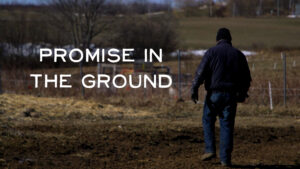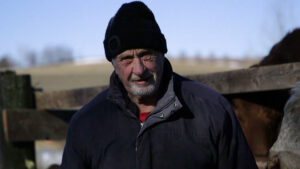Promise in the Ground producers reflect on what it means for their film to be selected for the Atlantic International Film Festival (AIFF)
Promise in the Ground is an eight-minute documentary about the challenges facing Kevin Graham, the 76-year-old owner of Oakview Farm in the Annapolis Valley, as he rebuilds after a devastating greenhouse collapse.
Produced by one-year Bachelor of Journalism graduates Ally Bowes, BJ’25, Ariel MacKenzie, BJ’25, and Linus Mulherin, BJ’25, the film was among those developed in King’s Advanced Video Workshop taught by Journalism Instructor Stewart Young and supported by Video Technician Paul Robinson this past winter.
On September 13, the film was screened at the prestigious Atlantic International Film Festival.
“It’s a significant achievement,” says Young, an independent producer who worked with CBC for 37 years. “They are up against filmmakers from around the world…. It means their creativity and storytelling stood out over others.”
Prior to the screening, we caught up with Young and the three producers to learn more about the film, the experience of creating it, and what it means for the work to be selected for the festival.
Tell me more about the documentary, and the concept behind it?
Linus Mulherin: We originally thought the doc would have something to do with food security and the broader “Buy Canadian” movement that was really picking up steam at the time, but Stewart Young, our instructor, encouraged us to dig deeper into the personal side of the story. And I’m very happy he did, because the end result was a subtler film that wasn’t so news-driven as it was character-driven. I hope it will be more enduring because of that.
Ariel MacKenzie: [Kevin] stole the show. And it wasn’t that hard to put his story into the documentary.
I know you developed the film as part of the Advanced Video Workshop. What were some of the highlights of participating in a workshop like that?
Ally Bowes: Beyond having a team built in, the support of our instructors Stewart and Paul. Every step of the way we were able to check in, get guidance, and have support through challenges.
LM: It was also fun to have such a hands-on course. Once we began shooting, it felt less like a class and more just like we were working on an actual film, which we were. We were doing road trips down to the Valley, organizing gear and doing coffee runs in between setting up shots on the farm.
AM: Having other students being able to comment on the different parts of the process, as well. We all in that workshop environment gave each other ideas, and it was truly a collaborative experience where I don’t think that would happen if it were just Linus and Ally and I alone and doing this by ourselves.
Stewart, what were some of your highlights from teaching the Advanced Video Workshop?
Stewart Young: I was very impressed by the enthusiasm of the students. This was the last session of their program, and they fully embraced the opportunity to create their own documentaries. It was also exciting to watch their willingness to help each other succeed.
What does it mean to you that the film was selected for the Atlantic International Film Festival?
AB: It means a whole lot in the simplest terms. I have loved movies and film making for a long time and have done things for school or helped my friends with projects. Having the first real film I’ve been a part of the process from start to finish being recognized in that way feels a bit surreal.
AM: It’s absolutely an honour to be selected. It’s a five-minute doc, so I hope people go and get to see it the way we want it to be seen. Even from the very beginning of it—the music and just, for a short film, everything is important, right? So, I hope that people do get the full scope of what we were trying to convey. Kevin is just so inspiring and there’s so much in those eight minutes of film. I hope people see the full Kevin in a sense.
And what advice might you give to students who are curious about filmmaking?
AB: Do it. Make the stupid short video, embarrass yourself a little, it’s fine. It’s the only way you’re going to improve but also find things you care about to film about. You’ll have a lot more fun if you’re interested!
SY: Watch as many documentaries as possible! Focus on why they moved you in terms of the story, structure and technical approach. Then use that learning and critical thinking as you start to work on your own ideas. Also, read the credits of those films and reach out to the folks involved in the production. In most cases, they will be generous with their advice and guidance.
AM: I would say take the courses. If you’re interested in it, get into it as much as you can. But, to me, finding a classroom that teaches you the way that King’s does is an unmatchable experience.
LM: The hands-on aspect is so valuable, because you get to learn and then put that learning into immediate practice. And if there aren’t any courses, I think you should just go ahead and make films anyway.



